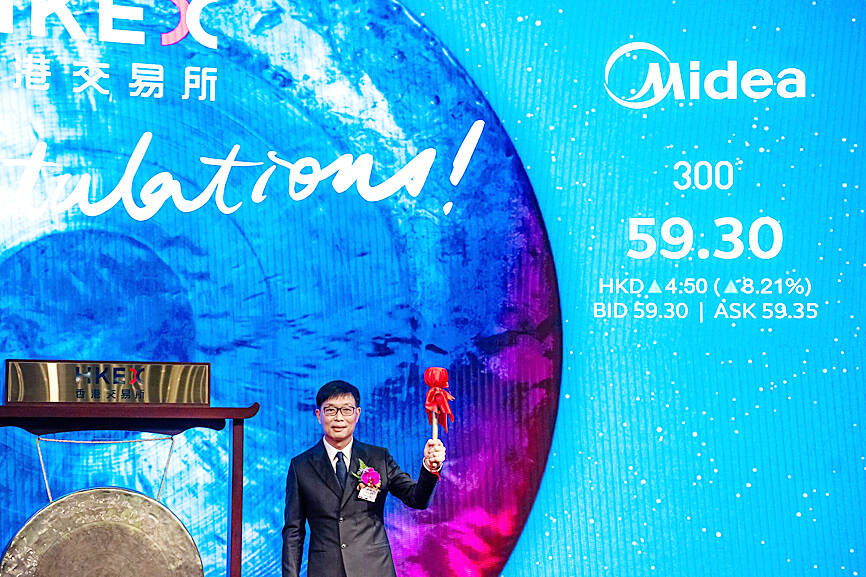Shares in Chinese electronic appliance maker Midea Group Co (美的集團) yesterday closed nearly eight percent higher on its Hong Kong debut, having raised about US$4 billion in the territory’s biggest initial public offering (IPO) in more than three years.
The firm closed at HK$59.1 following early exchanges where it spiked to HK$60.0, up from its HK$54.8 list price, which was at the top of the range indicated in its prospectus.
Midea’s bumper listing fueled hopes that the Hong Kong stock exchange can attract more top Chinese firms and regain its crown as the world’s top venue for IPOs.

Photo: Bloomberg
The Chinese finance hub has suffered a steady decline in new offerings since a regulatory crackdown by Beijing starting in 2020 led some Chinese mega-companies to put their plans on hold.
The territory had just 30 IPOs in the first half of this year, compared with more than 100 annually between 2013 and 2020.
“If this manages to hold on to gains for the week, it would definitely create a better IPO environment, paving the way for more to come,” Rockpool Capital Ltd (摩石資本) chief investment officer Benjamin Wong (黃務騰) told Bloomberg News.
Midea’s IPO has eclipsed the combined valuation of all of Hong Kong’s new listings so far this year, and is the territory’s largest since JD Logistics Inc (京東物流) and Kuaishou Technology (快手) in the first half of 2021.
The Foshan-based company last week expanded the number of shares on offer by about 15 percent to 566 million — an indicator of strong demand.
In a filing to the Hong Kong Stock Exchange on Monday, it said the international portion of the IPO was subscribed by more than eight times, before taking into account the adjustment to the offer size.
Midea chairman Paul Fang (方洪波) called the listing “a strategic step forward in the company’s globalization,” the South China Morning Post reported yesterday.
Cornerstone investors, including a subsidiary of Cosco Shipping Holdings Ltd (中遠海運控股) and part of UBS Asset Management Singapore Ltd, agreed to buy Midea stocks worth US$1.26 billion.
Founded in 1968, Midea has become one of the world’s largest sellers of home appliances such as washing machines and air conditioners and it also owns the German industrial robot maker Kuka AG.
Last month it reported a 14 percent rise in net profit in the first half of this year despite weakening consumer spending due to China’s economic slowdown, while revenue hit US$52.7 billion.
The company’s shares in Hong Kong were offered at a 20 percent discount compared to its stock price in Shenzhen, China, where it has been listed since 2013.
Hong Kong’s stock exchange received a boost earlier this year after Chinese regulators unveiled measures to support the territory’s status as a finance hub.
The exchange’s operator would also change its policy this month to keep trading through typhoons and heavy storms, in a bid to raise competitiveness.

SEMICONDUCTORS: The German laser and plasma generator company will expand its local services as its specialized offerings support Taiwan’s semiconductor industries Trumpf SE + Co KG, a global leader in supplying laser technology and plasma generators used in chip production, is expanding its investments in Taiwan in an effort to deeply integrate into the global semiconductor supply chain in the pursuit of growth. The company, headquartered in Ditzingen, Germany, has invested significantly in a newly inaugurated regional technical center for plasma generators in Taoyuan, its latest expansion in Taiwan after being engaged in various industries for more than 25 years. The center, the first of its kind Trumpf built outside Germany, aims to serve customers from Taiwan, Japan, Southeast Asia and South Korea,

Gasoline and diesel prices at domestic fuel stations are to fall NT$0.2 per liter this week, down for a second consecutive week, CPC Corp, Taiwan (台灣中油) and Formosa Petrochemical Corp (台塑石化) announced yesterday. Effective today, gasoline prices at CPC and Formosa stations are to drop to NT$26.4, NT$27.9 and NT$29.9 per liter for 92, 95 and 98-octane unleaded gasoline respectively, the companies said in separate statements. The price of premium diesel is to fall to NT$24.8 per liter at CPC stations and NT$24.6 at Formosa pumps, they said. The price adjustments came even as international crude oil prices rose last week, as traders

SIZE MATTERS: TSMC started phasing out 8-inch wafer production last year, while Samsung is more aggressively retiring 8-inch capacity, TrendForce said Chipmakers are expected to raise prices of 8-inch wafers by up to 20 percent this year on concern over supply constraints as major contract chipmakers Taiwan Semiconductor Manufacturing Co (TSMC, 台積電) and Samsung Electronics Co gradually retire less advanced wafer capacity, TrendForce Corp (集邦科技) said yesterday. It is the first significant across-the-board price hike since a global semiconductor correction in 2023, the Taipei-based market researcher said in a report. Global 8-inch wafer capacity slid 0.3 percent year-on-year last year, although 8-inch wafer prices still hovered at relatively stable levels throughout the year, TrendForce said. The downward trend is expected to continue this year,

POWERING UP: PSUs for AI servers made up about 50% of Delta’s total server PSU revenue during the first three quarters of last year, the company said Power supply and electronic components maker Delta Electronics Inc (台達電) reported record-high revenue of NT$161.61 billion (US$5.11 billion) for last quarter and said it remains positive about this quarter. Last quarter’s figure was up 7.6 percent from the previous quarter and 41.51 percent higher than a year earlier, and largely in line with Yuanta Securities Investment Consulting Co’s (元大投顧) forecast of NT$160 billion. Delta’s annual revenue last year rose 31.76 percent year-on-year to NT$554.89 billion, also a record high for the company. Its strong performance reflected continued demand for high-performance power solutions and advanced liquid-cooling products used in artificial intelligence (AI) data centers,